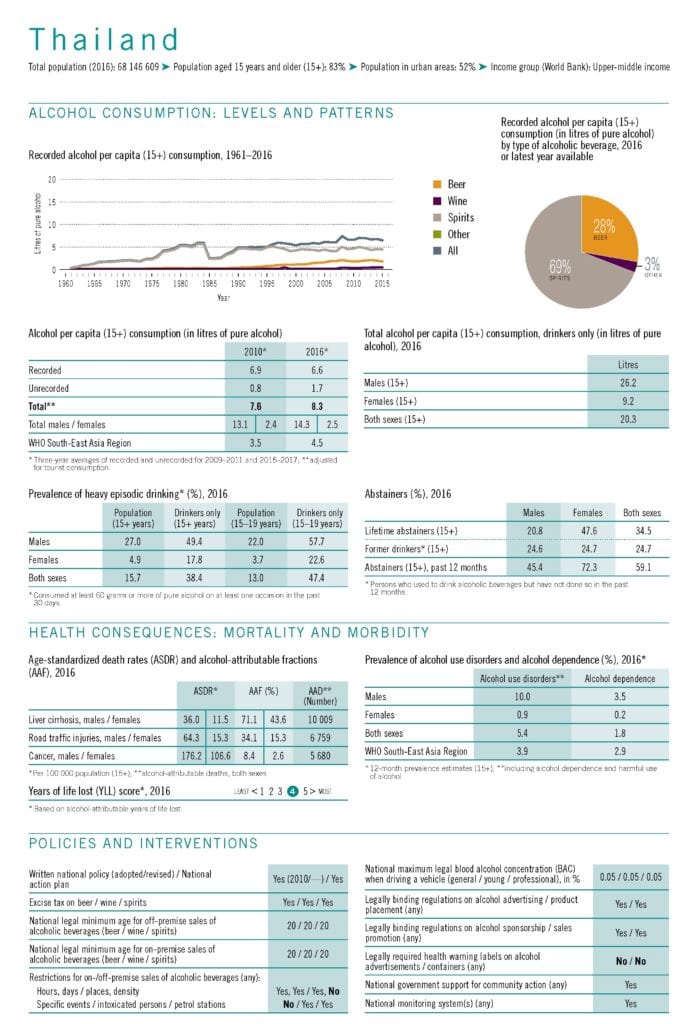Thailand celebrated National Alcohol-Free Day on July 14, 2022.
Every year since the 2017, the first day of “Khao Pansa” a Buddhist holiday has been marked in Thailand as National No Alcohol Day.
Khao Pansa marks the begining of the three month “vassa“. Celebrated by many Buddhist communities in the South East Asia this is the three month retreat when Buddhist monks and nuns remain in one place. Usually this is their temple grounds. The retreat ends in October when they can come out of the temple, in Thailand that day is called “Ok Pansa”.
In Thailand many Buddhists practice freedom from something considered harmful at the beginning of “vassa” such as meat or alcohol. This is one reason why “Khao Pansa” was declared as the National No Alcohol Day. Due to similarities with the Christian lent, vassa is also termed the Buddhist lent in Thailand.
Previously, ThaiHealth and the Stop Drink Network – a member organization of Movendi International – conducted an alcohol-free campaign for the lent period. That campaign saved over 8 billion bhat spent on alcohol and helped reduce alcohol-related deaths by 25% according to ThaiHealth.
Every year the Prime Minister writes a motto for The National Alcohol-Free Day. This year PM Prayut Chan-o-cha chose the motto “No Alcohol, No Disease, No Covid-19.” This is similar to last year’s motto which was “Don’t drink alcohol, stay far from Covid-19, life will be safe.”
Several events were organized in Thailand to celebrate No Alcohol Day. One such event was a discussion with four people whose lives have been seriously impacted due to the alcohol use of someone else. The discussion was hosted by the Network of People Affected by Drinking in conjunction with the Child Youth and Family Foundation and the Women and Men Progressive Movement Foundation (WMP) with support from the Thai Health Promotion Foundation (ThaiHealth).
ThaiHealth its networks have been campaigning to increase public awareness about the harms caused by the products of the alcohol industry. Two commercials have been running on Thai Television as part of this campaign. One centered around parental alcohol use and another on alcohol’s cancer risk.
Several of the Buddhist holidays in Thailand are demarkated as alcohol-free days by the government. These include Makha Bucha Day, Visakha Bucha Day, Asahna Bucha Day, and Ok Pansa. The dates change each year as per the lunar calendar.
On these alcohol-free days, alcohol sales are not allowed in Thailand. Violating the rule can lead to a prison sentence of up to six months and/or a fine of 10,000 baht.
Lethal interaction between alcohol and COVID-19
The motto for this national alcohol-free day is backed by science. As Movendi International has previously reported there is a lethal interaction between alcohol and COVID-19.
- Alcohol increases the health and societal problems arising from the pandemic. For example, alcohol weakens the immune system and makes people more susceptible to infections.
- And alcohol-centric social contexts have been COVID-19 super spreader events.
- Alcohol increases the burden on healthcare and emergency services which are already stretched due to the COVID-19.
- The alcohol industry exploits the pandemic to change alcohol laws to their private benefit.
Early on in the pandemic the World Health Organization (WHO) recommended reducing alcohol availability to curb the COVID-19 pandemic and reduce potentially severe complications of the virus.
Alcohol harm and policy in Thailand
According to the World Health Organization, the total per capita alcohol consumption in Thailand is 8.3 liters. This is higher than the WHO South-East Asia regional average. Thai men who use alcohol consume 26.2 liters of alcohol per capita. Nearly half (47.4%) of young people between 15 to 19 years of age who consume alcohol engage in binge alcohol use.
According to Rung-arun Limlahapan, director of ThaiHealth’s Office of Health Risk Control Plan, over 20% of road accidents in Thailand are caused by those who drive under the influence of alcohol. According to the WHO, in 2016 there were 6759 deaths caused by alcohol-related road traffic injuries. The damage costs about 90 billion baht a year.
About 80% of Thai people who had been surveyed reported being harmed by someone else’s alcohol use often in brawls or as a result of other problems.
Thailand is patricularly vulnerable to non-communicable diseases, according to the NCD Investment Case for Thailand. One reason is that Thailand has the highest level of alcohol use in the WHO South-East Asia region (twice the regional average).
Thailand does currently have a world class alcohol policy model consisting of the WHO recommended alcohol policy best buy solutions:
- The alcohol tax is earmarked to be reinvested in alcohol prevention and control and health promotion activities;
- The legal age limit and other alcohol availability regulations are better than in many other countries in the region and around the world;
- And alcohol marketing is also comprehensively regulated.
Without these evidence-based alcohol policy solutions, alcohol use and harm would have been even higher and would have risen even faster when the alcohol industry began pushing their products on the people in Thailand.
However improvements can be made to help the country reach its 10% alcohol consumption reduction target.
Alcohol policy improvements can also have a high return on investment. As per the NCD investment case for Thailand the alcohol policy best buys are projected to have the greatest impact in terms of lives saved (114,764 lives saved). And more than 5.8 million healthy life years could be gained through implementation of high-impact alcohol policy solutions in Thailand.
[This article was updated on August 3, 2022 as per new information from The Bangkok Post]
